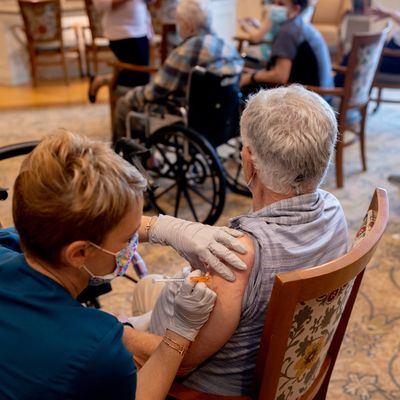
The Food and Drug Administration authorized Pfizer vaccine booster shots for Americans over the age of 65 on Wednesday, with third shots also approved for people between the ages of 18 and 64 who are at “high risk of severe COVID-19.” According to acting FDA commissioner Janet Woodcock, that group includes “health-care workers, teachers, and day-care staff, grocery workers and those in homeless shelters or prisons, among others.” A third shot can be provided six months after the second dose was administered.
The decision on Wednesday took place days after an FDA advisory panel voted 16-2 against approving a third dose for all Americans over 16 who had already received the Pfizer vaccine, a decision that frustrated the Biden administration’s plan to begin the widespread distribution of boosters on September 20. The panel did however conduct an unofficial vote on Friday unanimously in favor of giving boosters to those over 65 and for those at high risk of infection. Several of the panelists said they wanted to
wait for more data before opening up universal Pfizer boosters for adults, citing the increased risk of myocarditis in younger recipients.
As early as Thursday, the Centers for Disease Control and Prevention could issue their own recommendation for Pfizer boosters. The New York Times notes that even if the CDC panel issues a different guidance for boosters, the FDA’s recommendation allows health-care providers to administer third shots to those who meet the eligibility requirements. While the World Health Organization has come out against widespread booster rollouts — citing the vaccine nationalism that has undermined the global vaccination effort — the U.S. joins Germany, France, Israel, and Great Britain as wealthy countries with vaccination rates over 50 percent that have approved third shots. Since August, immunocompromised Americans were eligible for a Pfizer or Moderna booster through an FDA emergency-use authorization.
As for boosters for the tens of millions of Americans who received either the two-shot Moderna candidate or the single Johnson & Johnson shot, both firms have put forward evidence showing recipients would benefit from a booster. Moderna said early in September that it submitted initial data on a booster to the FDA. Pfizer is also expected to submit data to the FDA by the end of the month regarding smaller doses for children between 5 and 11. On Monday, the company announced that the research showed the shot was safe and created a “robust” antibody response in that age group.






























